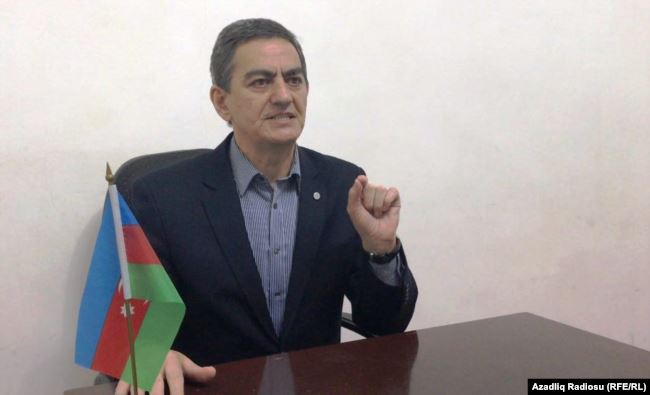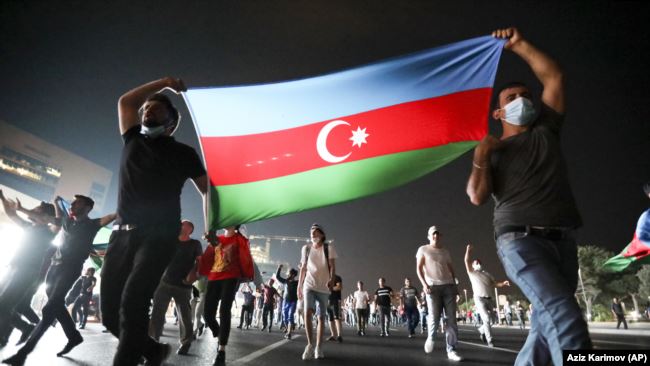Facing growing public dissent over corruption, a mismanaged economy, his handling of the coronavirus pandemic, and no progress in the country’s long-running conflict with neighboring Armenia, Azerbaijan’s strong-arm ruler Ilham Aliyev decided to crack down on the opposition.
In an action widely seen as an attempt to eliminate pro-democracy advocates and political rivals once and for all, as many as 120 opposition figures and supporters have been rounded up in the past two weeks by Aliyev’s security services.
They include senior members of the largest opposition group, the Azerbaijan Popular Front Party (AXCP).
Political analysts say charges of “attempting to overthrow the government” against the AXCP’s Fuad Qahramanli and Mammad Ibrahim suggest Aliyev’s regime is ultimately seeking to arrest and silence AXCP leader Ali Karimli.
Karimli offered on July 30 to be arrested in exchange for the release of more than 40 AXCP members who he says have been jailed on bogus charges.
Karimli also says he is ready to resign as leader of the AXCP if it helps bring an end to the crackdown on the opposition.

The immense crackdown has also targeted members of other parties within an opposition alliance known as the National Council of Democratic Forces — an umbrella group that includes the AXCP, the Musavat Party, the Muslim Unity Movement, and others who have fought against Aliyev’s oppressive rule.
An editorial by The Washington Post on July 29 said Aliyev has “blown a gasket” with a “tantrum” that is “threatening to obliterate what remains of independent political forces in Azerbaijan.”
“Mr. Aliyev’s use of the iron fist to destroy his critics is the opposite of democracy and why everyone should worry about this intemperate tyrant,” the editorial concluded.
‘Death Of The Dream For Democracy’
Alex Raufoglu, a Washington-based Azerbaijan specialist for Amnesty International, told RFE/RL that Aliyev’s latest crackdown has been ominously calculated.
“President Aliyev feels he has a green light for this crackdown because Western democracies are too busy right now focusing on their own problems with the coronavirus and their economies,” says Raufoglu, who also is a journalist for the independent Turan news agency.
“Thanks to COVID-19 and recent border clashes between Azerbaijani and Armenian forces, Aliyev has found that he can go after his opponents without having to face international criticism,” Raufoglu told RFE/RL.
“With a snap of his finger, President Aliyev can decide everything himself in the cases against his rivals without any due process,” Raufoglu says. “This could be the death of the dream for democracy in Azerbaijan.”
Indeed, Azerbaijan’s government has a long history of using its criminal justice system to silence political rivals and journalists who criticize the corruption that has enriched Aliyev’s relatives and inner circle of allies.
Aliyev has been the president of Azerbaijan since 2003, when he leapfrogged into the post upon the death of his father. His authoritarian rule has shut down independent media outlets and suppressed opposition parties while holding elections deemed neither free nor fair by international monitoring groups.
Baku has also banned international monitors from groups like Human Rights Watch and Amnesty International that have documented how authorities routinely use torture to extract false confessions from political prisoners jailed on trumped-up charges.
Qahramanli has been imprisoned twice on charges that Human Rights Watch has described as politically motivated violations of his rights.
And such heavy-handed tactics from Azerbaijan’s criminal justice system have seemingly had a chilling effect on many of Aliyev’s domestic critics.
Countdown To Crackdown
On November 2, the National Council of Democratic Forces canceled an anti-government protest it had planned in Baku.
Opposition leaders said they did so because they feared Aliyev’s security services would use “strong provocations” to disrupt the rallies and discredit their members.
Other recent demonstrations have been violently dispersed by police in Baku.
In February, when Azerbaijan staged early parliamentary elections, opposition parties accused Aliyev of limiting their ability to campaign and called for a boycott of the vote.
Meanwhile, the World Bank warned that Azerbaijan faced the prospects of a severe “economic contraction” in 2020 due to the coronavirus and falling global prices for its main export, oil.
In March, in a speech ostensibly about his plans to combat the pandemic, Aliyev intensified his attacks on the opposition — describing them as “enemies who are among us,” and a kind of “fifth column” of “traitors” whose “main goal is to destroy Azerbaijan.”
“The isolation of representatives of the fifth column will become a historical necessity” during the pandemic, Aliyev proclaimed.
Looking back on that speech, Raufoglu says the crackdown Aliyev launched after Azerbaijan’s July 12-16 military clashes with Armenia along their border is “unprecedented” even by Azerbaijani standards.
“Increasingly, we see that Aliyev is trying to take advantage of the country’s national crises — whether it is about public health or a potential war with Armenia,” Raufoglu says.
A total of 11 Azerbaijani soldiers, including a popular general, were killed in the border clashes along with four Armenian soldiers.
Baku and Yerevan have accused each other of starting the fighting.
But Thomas de Waal, an expert on the Caucasus, tweeted on July 15 that it is “unclear” which side is responsible.
“As soon as one side starts, the other responds, neither backs down,” de Waal wrote. “The conflict sits deep in both nations. We see a rallying round the flag in both countries. That’s useful to both governments [as it] distracts the people from economic woes and pandemic.”
‘Teach Them A Lesson’
Indeed, the AXCP’s leadership announced on July 13 that the opposition would not stage any political protests as long as fighting continued along the border.
“We are behind our state and the army,” AXCP leader Karimli declared.
The next day, Azerbaijanis from all political persuasions gathered at Baku’s Freedom Square for what initially appeared to be a spontaneous display of patriotism and support for the country’s armed forces.
But instead of deploying their usual forceful tactics to break up unauthorized demonstrations, police herded and ushered the crowd several kilometers across Baku to a national cemetery near parliament called Martyr’s Alley.

Martyr’s Alley contains the graves of fallen national heroes from Azerbaijan’s long-running conflict with ethnic Armenian separatists over Azerbaijan’s breakaway region of Nagorno-Karabakh.
At the cemetery, late in the demonstration, a group of people emerged from the crowd and briefly stormed into the nearby parliament building before being removed by police.
Opposition leaders claim the incident was a “provocation” staged by Aliyev’s henchmen to justify the harsh political crackdown that would follow.
In fact, they say, the AXCP’s Qahramanli and Ibrahim did not even attend the July 14 rally.
But the next day, on July 15, Aliyev made a nationally televised speech accusing the pro-democracy opposition of being “enemies” who were “worse than the Armenians.”
“We have won a great victory and the people supported us,” Aliyev claimed. “The people came to Martyr’s Alley to celebrate the victory and honor the memory of our martyrs, and some shameless elements cause riots there?”
“This will not happen,” Aliyev declared. “It is not the beginning of the 1990s. We have taught and will teach them a lesson.”
Aliyev said he’d been “informed” that “some opposition structures, including representatives of the Azerbaijan Popular Front Party, infiltrated the masses and tried to induce people to take illegal actions.”
“They were also among the lawbreakers and have already been identified,” Aliyev said, adding that he would “not pay attention” to criticism from the Council of Europe or other “international organizations” about his crackdown on the opposition.
Aliyev also said he would “block anti-Azerbaijani” candidates in the future from challenging his government and trying to “slander Azerbaijan.”
Raufoglu says the effort by police to direct the crowd toward parliament, as well as Aliyev’s haste to blame the AXCP for storming the building, “raises many questions about what really happened” during the July 14 rally.
“In this moment of rallying around the flag, Aliyev used the incident to immediately go after his political rivals,” Raufoglu told RFE/RL. “For Aliyev to use that rally as a reason to go after the opposition is absolutely staggering — even by Azerbaijan’s standards.”

